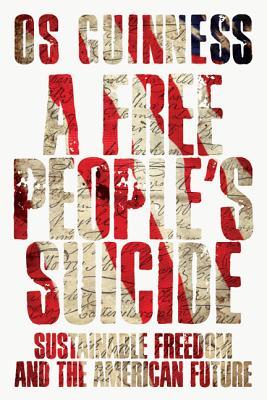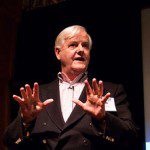What if freedom is its own worst enemy, and Americans’ abuse of their freedoms will undermine freedom in the proper sense and ultimately dismantle our society? This is the question posted in Os Guinness’ new book, A Free People’s Suicide: Sustainable Freedom and the American Future. Guinness, in the tradition of Alexis de Tocqueville or G. K. Chesterton’s “What I Saw in America,” is a foreign-born observer of American culture and admirer of the audacity of the American experiment. See the end of this post for more biographical information.
“There’s no question that what is loved supremely amongst Americans,” he says, “and America’s significance for the world, is freedom.” But the seeds of our greatness are also the seeds of our demise. A Free People’s Suicide is a powerful analysis of American society and its slow and disastrous drift away from its Constitutional moorings. The following is the first in a series of posts that feature and reflect on an interview with Dr. Guinness. Please subscribe to make sure you don’t miss later installments.
*
 Why the title, “A Free People’s Suicide?“
Why the title, “A Free People’s Suicide?“
The title goes back to Abraham Lincoln. “As a nation of free men, either we will live free for all time or die by suicide.” Strong, free nations always bring themselves down. That’s going to be America’s problem. It won’t come down from foreign challenges but by internal corruptions, and in this case by the corruption of freedom.
This book concerns the audacity of the Framers’ view that freedom could last forever. They had an extraordinary system to do it, but the present generation has abandoned that system. Do we have something better? Are we dealing with unforeseen issues? Or are we drifting with complacency? I’m afraid the story is the latter. It saddens me that America is not living up to her own ideals. In the end, she will be judged not by the world but by her own ideals.
This book hits the market in the heat of an election season. Is this a partisan issue?
This is explicitly not a partisan issue. The corruption of freedom is worked out in different ways on either side of the aisle. The framers had a vision of freedom which, in isaiah Berlin’s terms, was not only negative freedom from but also a positive freedom to be. American freedom now is almost exclusively freedom from — freedom from interference or freedom from constraint — which is close to a practical libertarianiam. The liberal side says, “Get the government out of my body.” The conservative side says “Get the government out of all areas of my life.”
This is very different from the framer’s vision of freedom. Freedom for them, of course, was one word that incorporated honesty and patriotism and loyalty, and the nurturing of this freedom required virtue. So the issues I’m talking about in the book lie below the state of the union. I would say that this is not a partisan book, but the issue below the partisan issues that should concern Americans on both sides. The state of the union address very rarely addresses the true state of the union.
We often hear from politicians partisan, self-serving appeals to the Framers and our founding documents. Each side accuses the other of “shredding the Constitution.” You say you’re speaking of something more fundamental than the usual partisan debates. What is that fundamental thing? What was distinctive in the way the Founders thought of freedom and how it should be exercise and protected in the United States?
As I understand the American Founders, the most brilliant and daring idea they had was that it’s possible to create a free society that could stay free forever.
The founders were not merely revolutionary. They were rooted. They knew their classics, and they knew from writers such as Cicero and especially Polybius that no system ever lasted, and free systems are especially precarious because freedom is the greatest enemy of freedom. So they devised a system that would have antidotes built into it. I think their system was positively brilliant, and yet the present generation either totally ignores it or pretends that it has something better. I think modern American freedom is unsustainable.
Why is freedom its own worst enemy?
The paradox at the heart of freedom is that the greatest enemy of freedom is freedom itself. Two things lay at the heart oft he conundrum. The first is political. As the French writer Montesquieu taught, freedom does not just depend on the structures of liberty, such as the Constitution or the Law, but it depends on the spirit of liberty. The structures you can put in place once and for all. But the spirit, you have to keep alive in the citizens from generation to generation. Clearly that is what is gone from America today. You still have the Constitution — but you’ve lost the spirit of liberty.
The other element is even deeper still. Freedom always requires a certain order, and the only ordering that’s appropriate to freedom is self-restraint. Yet self-restraint is precisely what’s undermined when freedom flourishes. So freedom destroys its own boundaries and very quickly becomes license and permissiveness, and that’s what’s happening in America today.
You call on Americans to cultivate the essential civic character needed for ordered liberty and sustainable freedom. What is America’s essential civic character? Or what does that look like for individual Americans?
The habits of the heart are even more important even than the law. I call it the golden triangle of freedom — and you can put it very simply. Freedom requires virtue, virtue requires faith, and faith requires freedom. It goes round and round. If you just take the first leg, freedom requires virtue; only a virtuous people are capable of freedom in its truest sense. So you have a stress, for example, on character. Leadership in a free society requires leaders with real character. John Adams among others uses words like inimitable, indefeasible, all the words you would expect to line up in the category of freedom. But he uses it of the people’s right to know the character of their leaders. Modern Americans have abandoned that. You can take the Clinton impeachment when various intellectuals wrote inThe New York Times that character is irrelevant and what matters in a president is competence. You could have a president with the morals of an alley cat as long as they had competence. That’s the modern emphasis, and it’s working itself out in leadership, in the affairs of Wall Street and the banking industry, and so on. There’s a real crisis of what it takes to keep freedom going.
Are you not idealizing the Framers? What would you say to those who would object that we actually have greater freedoms today, and freedoms extended more broadly to all people, than we did in the time of the Founding?
The Framers had their blind spots. So their treatment of slaves and Native Americans and women were egregious mistakes of the Framers. The trouble is, the baby, the bathwater and all has been thrown out. I would say the Framers got religious freedom nearly perfectly right from the very beginning. There were no blind spots there, yet we’ve departed from that. and their view of the way freedom needed to be sustainable, and how it needed to be sustained, they had very daring answers that were almost entirely correct right from the start. We’ve abandoned those as well. So we need to distinguish carefully where we openly acknowledge the Framers were wrong, and where they were brilliantly right.

Editor’s Note: This is the first in a series based on my interview with Dr. Guinness. Please check back over the weekend and throughout next week for more. And check out Dr. Guinness’ book on Amazon.
The great-great-great-grandson of Dublin brewer Arthur Guinness, Os was born in China and observed the communist revolution there in 1949. Returning to England, he obtained his degrees from Oxford, including his D.Phil. in 1981 from Oriel College, and came to the United States in 1984. He has written or edited over thirty books, and many Americans will know Dr. Guinness through his work with the Trinity Forum and his appearances at numerous Veritas Forums at universities around the country, through his frequent (and extraordinarily eloquent) public speaking engagements, and through his writing.










